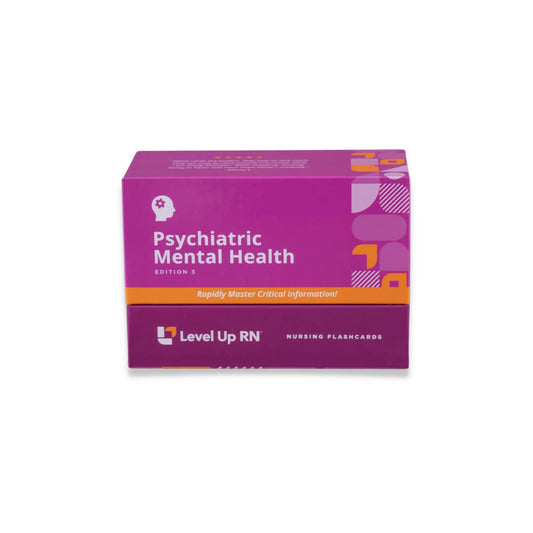Psychiatric Mental Health, part 19: Therapies - Tricyclic Antidepressants
Tricyclic antidepressants, including amitriptyline and imipramine. The indications, mode of action, side effects, and patient teaching associated with this medication class.
Full Transcript: Psychiatric Mental Health, part 19: Therapies - Tricyclic Antidepressants
Full Transcript: Psychiatric Mental Health, part 19: Therapies - Tricyclic Antidepressants
Hi, I'm Cathy with Level Up RN. In this video, we are going to talk about tricyclic antidepressants. And at the end of the video, I'm going to give you guys a little quiz to test your knowledge of some of the key points I'll be covering. So definitely stay tuned for that. And if you have our Level Up RN Psychiatric Mental Health Nursing Flashcards, definitely pull those out so you can follow along with me. Tricyclic antidepressants include medications such as amitriptyline and imipramine. These medications are not only used to treat depression, they are also used to treat neuropathy, fibromyalgia, anxiety, and insomnia. The mode of action of tricyclic antidepressants is to increase the effect of serotonin and norepinephrine in the central nervous system. Side effects are very important to know. And those include sedation, orthostatic hypotension, anticholinergic effects, such as urinary retention, constipation, dry mouth, photophobia, and tachycardia. Tricyclic antidepressants can also cause sweating, seizures, as well as arrhythmias. So a little hint to help you remember some of those important anticholinergic effects is the following rhyme. Can't see, can't pee, can't spit and can't poop. And then our cool chicken hint to help you remember that amitriptyline is a tricyclic antidepressant that has drying effects is to think of Amy tripping over a tricycle in the desert where it is very dry. There are some key teaching points that you'll want to provide your patient who is taking a tricyclic antidepressant. So first of all, you should advise them to change positions slowly due to the side effect of orthostatic hypotension. They can chew gum or suck on hard candy for the dry mouth. And then they should increase their fluid and fiber intake in order to prevent constipation.
All right. It's time for a quiz. I have three questions for you. First question. Diarrhea is a key side effect of amitriptyline. True or false? The answer is false. So the anticholinergic effects of this medication include constipation as opposed to diarrhea. Question number two. Bradycardia is a key side effect of imipramine. True or false? The answer is false. So anticholinergic effects include tachycardia as opposed to bradycardia. Question number three. You should teach your patient to change positions slowly due to the risk for blank when taking a tricyclic antidepressant. The answer is orthostatic hypotension. Okay. I hope you did great with that quiz, and I hope you found this video to be helpful. If so, be sure to hit that like button. Take care and good luck with studying.


